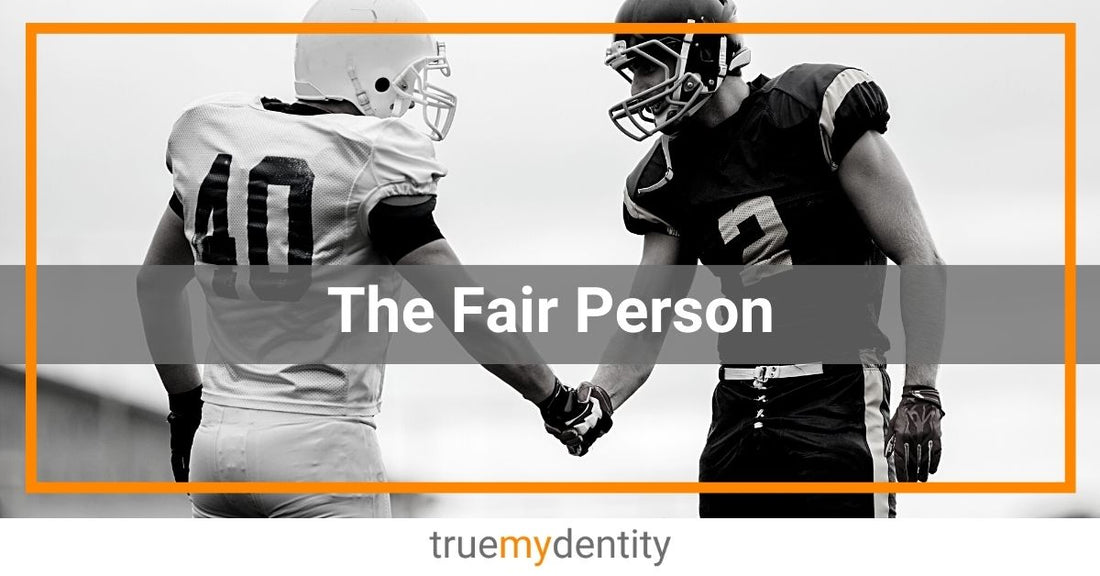
The Fair Person | Being Fair and the Importance of Fairness
Luke FeldbruggeShare
A fair person is one who believes in and works toward fairness and equality; especially in status, rights and opportunities. They are impartial and do not take sides or show favoritism towards any particular person or group; treating everyone equally without bias. Being fair also means being objective, open-minded, and willing to listen to all sides of an issue before making a decision. In this post we look at the fair person, what being fair means, why it is important to be fair at work and in relationships, and how to be more fair with the people in our own lives.
What is the Meaning of Fair, or Being Fair?
Merriam-Webster's FAIR definition is (plus we spice it up a bit): marked by impartiality and honesty; free from self-interest, bias, prejudice, favoritism or discrimination; treating someone in a way that is right or reasonable; conforming with the established rules.
True Mydentity prefers to add a little more flavor to that meaning of fair. Here are some valuable ways the fair person may use their power:
Do you tend to use phrases like these in your conversations or personal thoughts:
- All is fair in love and war my friend.
- I guess that’s fair enough.
- I didn’t get a fair shake for that promotion.
- To be fair, we all should have a chance at it.
- I gave you fair warning.
- Did you get your fair share?
- We played for it and I won, fair and square.
- That all sounds fair to me.
- That’s not fair, or no fair!
If you find yourself using these phrases in your life, it seems acting in fairness and being a fair person may be an important perspective of yours.
It is so powerful to be accepted and given the opportunity to reach your potential. To feel equal to others; to be treated as an equal, and to be given the same chance to succeed.
Each person has a heart that pumps their blood, lungs to breathe, muscles to move their body, a brain that makes it all work, and a soul that connects them to you, me and everything else. At the core we are all the same; with slight variations to the same recipe that make each of us a unique person.
And out of respect, the fair person wants each of us to get a fair shot at things.
Complete our free questionnaire and find out if being fair is one of your most dominant character traits, and which of the other 58 traits are also your most powerful qualities.
Why is it Important to be Fair
Treating people fairly and giving them equal opportunities to reach their full potential is important in fostering a just and equitable society that enables the talents and skills of its people to contribute and succeed. It boosts morale and productivity, promotes trust and respect, encourages diversity, builds positive relationships, and reduces conflict.
Being Fair in School
Fairness in school ensures all students are given the same opportunities to succeed, regardless of their background or circumstances, and this levels the playing field. Fairness promotes a positive and supportive learning environment where students feel valued and respected; establishing a sense of community that fosters positive relationships among students, and between students and teachers. It creates a safe and supportive environment where students can learn and grow.
Establishing a fair school environment helps students develop important character traits, like being empathetic, cooperative, honest and kind. It teaches them to be responsible and accountable for their actions, and to treat others with dignity and respect. It helps everyone, students and faculty alike, to understand that fairness is a core value that should be applied in all areas of their life.
Being Fair at Work - The Fair Employee and Employer
Fairness is a hallmark of professionalism, and being a fair employee to fellow employees can help to demonstrate your professionalism to your manager, peers and direct reports. This can be particularly important if you work in a field where professional conduct is highly valued. When you are fair to all other employees, it shows that you are trustworthy and have integrity. This shows your manager they can rely on you to act ethically and professionally.
Fairness is closely tied to respect, and being respectful of others is a key trait that employers look for in their employees. If you are a fair person toward all other employees, it shows that you respect others' opinions and contributions, which can be very important in a team environment. Treating your fellow employees fairly tends to show that you are willing to work with others and are committed to achieving shared goals.
Fairness can also help to reduce conflicts in the workplace. When employees feel that they are being treated fairly, they are less likely to become embroiled in disputes with other employees or their employer. This can lead to a more harmonious workplace, where everyone can focus on doing their jobs.
Fairness at work also promotes diversity and inclusion by ensuring that all employees are given the same opportunities to succeed, regardless of their background or circumstances. This creates a more diverse and inclusive workplace where everyone can contribute and thrive.
Being Fair in Relationships
When you treat the other person in the relationship fairly, they are more likely to trust you. Trust is a crucial component of any relationship, and it is essential to building and maintaining strong relationships. If a conflict were to arise in a relationship, treating each other fairly can quickly resolve an issue constructively and peacefully.
When people feel that they are being treated fairly, they are more likely to work collaboratively more effectively with others. They tend to be more open to new ideas and approaches to problem-solving. Effective collaboration can lead to better results and stronger relationships, both personally and professionally.
Being a fair person in your relationships can improve communication by creating an atmosphere of trust and respect. People are more likely to express themselves honestly when they feel that they will be heard and understood.
6 Tips on How to be More Fair
1) Be a Good Listener
Active listening is a crucial skill in being fair to others. When talking with others, make a conscious effort to listen to their thoughts and opinions with an open mind. Acknowledge their ideas and try to incorporate them into the discussion when they are relevant. After someone speaks, reflect back on what they said to ensure you understood their point of view. And when someone shares an idea or opinion, ask questions to gain a better understanding of their perspective. In group settings, make sure that everyone has an opportunity to speak and be heard. Don't let any one person dominate the conversation, and make sure that quieter voices are given a chance to speak up.
2) Be Open-Minded
Being open-minded allows you to consider different perspectives and ideas, leading to more creative and effective solutions. Encourage others to share their ideas and perspectives, even if they differ from your own. When faced with a problem, consider multiple solutions from multiple sources, including from other people with different ideas. When making decisions that affect others, consider the points of view of those it affects. This can help to ensure that everyone's needs and interests are taken into account.
3) Be Empathetic
Empathy is essential to being fair because it helps you understand how others are feeling and respond appropriately. Put yourself in their shoes and imagine how you would feel if you were in their position. This will begin to help you better understand their perspective. Acknowledge their feelings. Show that you understand and respect their feelings by acknowledging them and responding appropriately.
4) Be Transparent
Be open and transparent about your decision-making process, especially when it affects others. Explain your rationale and be willing to listen to feedback from others. This can help others understand why you made a certain decision and can build trust. When making a decision that affects others, explain your thought process and the factors that influenced your decision. This can help others understand why you made the decision and can help them accept it, even if they don't agree with it. If you make a mistake or do something that others perceive as unfair, be open about it and apologize if necessary. This shows that you are accountable for your actions and that you value fairness and honesty.
5) Practice Self-Reflection
Regularly reflect on your own biases, assumptions, and behaviors. Put the work in to correct any unfairness you may be unintentionally exhibiting. This can be a difficult process, but it's important to be aware of the differences between people without judgment or favoritism. It is also important to recognize and understand that the human brain experiences cognitive bias, which is a systematic error in thinking that can affect one's decisions and judgments. Think of it as the brain taking a shortcut to simplify processing information. Challenge yourself to question your assumptions and to seek out accredited information with diverse perspectives. This can help you to become more self-aware, improve your interactions with others, and to become more fair toward others.
6) Treat Everyone Equally
Bottom line, to be a fair person it is important to treat everyone equally; regardless of their race, gender, age, or any other characteristic. Treat each person as a unique individual who is part of the same human whole. Avoid making assumptions about people based on their appearance or background. Avoid favoritism or showing special treatment toward any particular person or group. Be consistent in your actions and decisions, and make sure that everyone is held to the same standards. Practicing these things can help to ensure that everyone is treated fairly and that there is a level playing field; giving everyone the opportunity to participate and succeed.
Fair - True Mydentity Style
True Mydentity offers designs on our clothes that highlight 58 positive character traits. The powerful fair trait is one of the 58 character traits featured. We believe if you know your dominant positive characteristics; focus on what you do to learn, work and build relationships using these dominant traits; you will feel more fulfilled and closer to your purpose. And as you improve upon leveraging these positive character traits in those three areas of your life; you move toward discovering your full potential.
If being fair is an important part of who you are, make True Mydentity’s Fair apparel part of your character’s power suit; and be the fair character you’re meant to be.
VIEW FAIR APPAREL COLLECTION >>
Complete True Mydentity’s FREE questionnaire and find out which of the 58 traits are your most dominant.



